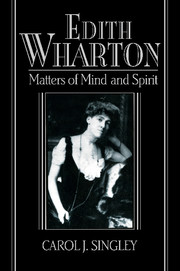6 - Catholicism: Fulfillment or Concession?
Published online by Cambridge University Press: 06 August 2010
Summary
I don't believe in God but I do believe in His saints – and then?
Edith Wharton, commonplace book, qtd. in LewisReligious thought is certainly a great power. The greatest of all. It embraces everything.
Edith Wharton, qtd. in Elisina Tyler, DiaryLater [Edith Wharton and I] talked a little of religion. The Roman Catholic Church ranks highest, as a great social force for order, and for its finest ritual, its great traditions, its human understanding. We said that it is really not difficult to believe.
Elisina Tyler, DiaryIf Wharton flirted with agnosticism in midlife, she came to faith in her later years, expressing a confidence in heaven and its ruling deity. Such belief is clear from her correspondence. About the death of her friend Lily Norton's aunt, Wharton wrote in 1926, “I hope she is now in some happy world talking over Montaigne with a group of sympathizers, or, better still, talking to the Great Man himself” (Letters, 12 June). In 1934, she again commented to Lily: “The thing that moved me most in your letter was the inscription on the war-graves: ‘Known to God.’ It was an inspiration” (Letters, 19 October). Increasingly, this faith became aligned with Catholicism, constituting – to borrow the title of her 1934 short story – Wharton's personal case of “Roman fever.”
- Type
- Chapter
- Information
- Edith WhartonMatters of Mind and Spirit, pp. 184 - 208Publisher: Cambridge University PressPrint publication year: 1995



